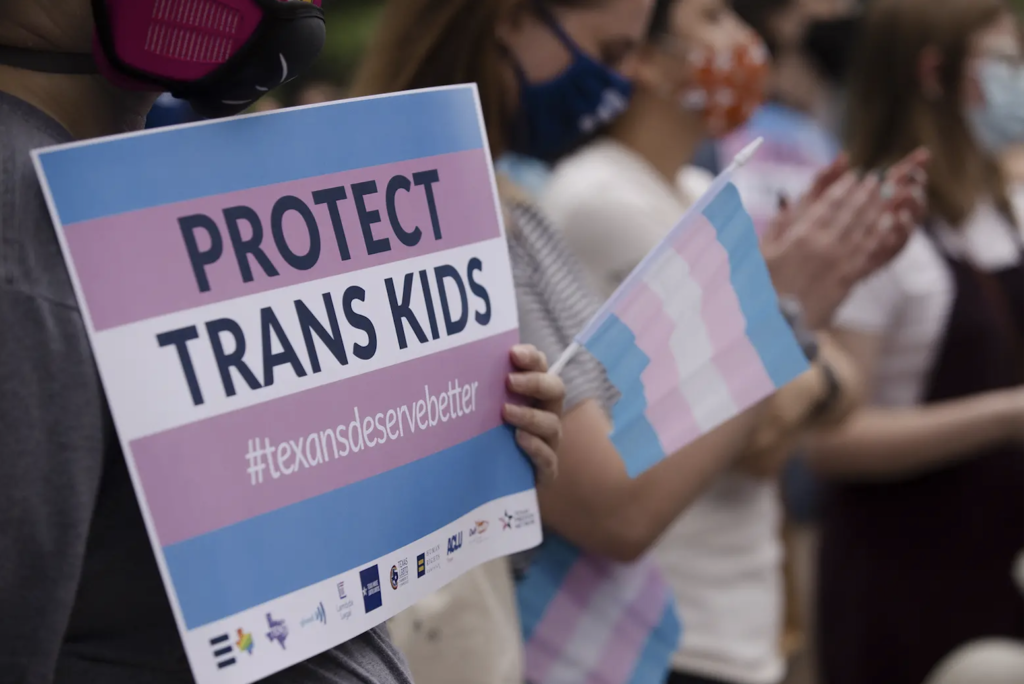
Texas’ Transgender Sports Law Goes Into Effect
School districts say they will abide by the law, but it’s still unclear how they will determine whether a student’s birth certificate was issued near the time of birth.

Julia wouldn’t describe herself as the “biggest sports person” in the world. She’s not into basketball or football. She played soccer when she was little, but it didn’t stick as she got older.
What she’s really into are sports like cross country and track, which she feels are smaller in scale and more intimate. She trained with her dad, who used to run track in high school, and soon discovered she had a knack for it.
“He taught me the form and how to run, and I just fell in love with running hurdles because I was good at it, but also, it just gave me a feeling that you don’t really feel in a lot of other situations,” she said. It feels like putting life on pause for 20 seconds or so, she added, and “you only focus on what you’re doing and how to do it right.”
It’s this feeling Julia chases when she practices — but as a transgender athlete, she hasn’t been able to pursue it in competition. Because of statewide rules, she’s essentially barred from competing against other girls.
“The government and Greg Abbott think that I’m good because of how I was born, but really, I’m good because I know how to do the form, and I’m good because I practice my ass off,” said Julia, a transgender girl who attends high school in Central Texas and has requested to use a pseudonym and remain anonymous to protect her privacy. “Honestly, with the leadership that we have right now and who all is in charge and making the rules, I don’t think that I’m going to be able to run.”
Last year, the Texas Legislature passed House Bill 25, which requires that student athletes play on sports teams that correspond to the sex listed on their birth certificate, and the certificate athletes present must have been issued near the time of birth. The law went into effect Tuesday, making Texas the 10th state in the U.S. to enact similar legislation.
Supporters of the law argue it is necessary to protect women’s sports from what they deem unfair competition. State Rep. Valoree Swanson, R-Spring, said one of her main reasons for authoring the bill was to “protect girls’ safety.” She did not respond to requests for comment for this story.
The law targets transgender youth, a rather small slice of the state’s population. Data shows less than half of LGBTQ youth participate in sports and it’s predicted the number of transgender youth is even smaller.
Nevertheless, legislation targeting trans people has been a prominent part of the Texas GOP’s agenda in recent years. The transgender sports bill was part of a litany of anti-trans legislation introduced last year during Texas’ four legislative sessions that pushed some LGBTQ families to question their residency in the state and have led to detrimental mental health effects on LGBTQ youth, said Ricardo Martinez, executive director of Equality Texas, a statewide advocacy organization for LGBTQ Texans.
“Lawmakers have willingly ignored the overwhelming harm that this bill and bills like it has already caused in favor of exploiting our differences and the lack of familiarity that some people may have about transgender people,” Martinez said. “This we know stokes fear, and it divides us.”
Advocates for transgender youth say they are bracing for the impact of the law’s implementation and the heightened scrutiny of transgender youth and their bodies. School districts have said they will abide by the law, but it’s still unclear how that will look in practice and how schools will determine whether a student’s birth certificate was issued near the time of birth.










